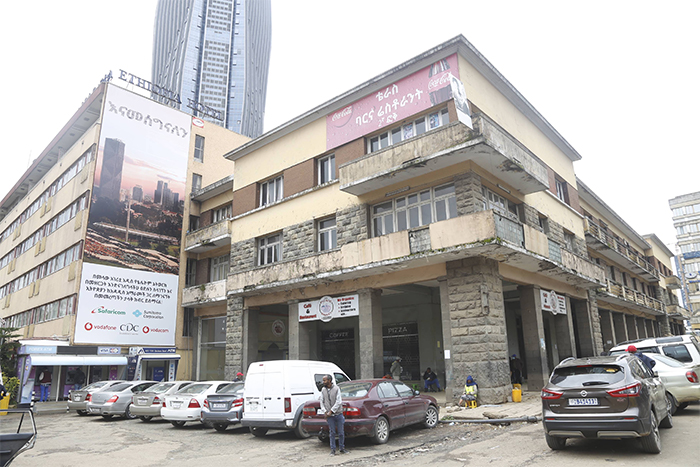
Mar 28 , 2020
By Christian Tesfaye (
Christian Tesfaye (christian.tesfaye@addisfortune.net) is a researcher and Fortune's Deputy Editor-in-Chief whose interests run amok in the directions of political thought, markets, society and pop culture.
)
If we all had mansions, adequate access to water and sanitation, constant power and internet connections and a government that could afford to subsidise paid leave for large swaths of the population, we would sail smoothly through the COVID-19 pandemic.
Unfortunately, most of the world is not this lucky. Ethiopia is the poster child for nations that cannot implement social distancing and public sanitation and hygiene policies at will. This is something that will be all the more evident as the number of cases inevitably rises, and containment becomes ever more critical.
Within just two weeks, the number of Coronavirus cases in Ethiopia has reached 12. It is not an escalation mirroring that of countries worst affected by the disease, at least not yet, but it is nothing to baulk at.
Commendably, the government is not sitting idly by. It has taken precautionary measures in its effort to curb the spread of the virus. The country’s borders have been closed off except for the transport of cargo, all passengers arriving in Ethiopia are being quarantined for 14 days and nightclubs and bars have been closed. Members of the civil service, except those considered essential, are also expected to work from home. It is a sort of paid leave, considering the lack of infrastructure or resources to ensure that they could continue to work from home.
These are aggressive as well as proactive measures that indeed need to be taken to escape the worst of the devastation of this disease. More importantly, these are the sort of measures overlooked by countries suffering from the worst effects of the pandemic – such as Italy and the United States - but were observed by Asian countries that were able to “flatten the curve.”
But while the measures the government is taking are necessary, they fail to consider the socioeconomic circumstances of the country. Many of the precautions are aimed at ensuring that social distancing and hygiene are observed. Self-isolation, telecommuting, washing hands and sanitizing surfaces, reduction of physical transactions and human contact are some of the methods and practices with which the spread of the virus can be beaten.
Many of these measures are costly and inconvenient - despite being crucial - even for developed countries such as the United States and European nations. For countries such as Ethiopia, they mostly do not even sound possible. This is because of the vast differences in socioeconomic circumstances between rich nations and countries such as Ethiopia.
In Ethiopia, households are often large. There is a high level of social mixing; inadequate access to water and sanitation; and a lack of adequate access to power and internet connections for telecommuting. It would be impractical to put in place policies aimed at enforcing social distancing and hygiene when neither the infrastructure (social or economic), the experience, nor the resources are there to support such a transformation.
In a deeply conservative country, how is it possible to limit gatherings in religious places and important social events, such as funerals? In a country where a third of the economy is informal, GDP per capita is below 1,000 dollars, and there is no fiscal space to subsidise large sections of the population being on paid leave, how can people stay at home?
"I earn eight dollars every day, and I have five people to feed. We will run out of food in a few days. I know the risk of Coronavirus, but I can't see my children hungry," said an Indian, in a dilemma we can appreciate, speaking to the BBC.
This does not mean that the current measures being taken are unnecessary. But effectiveness will be determined in how much the government succeeds in marrying such precautions with the socioeconomic circumstances of the country. Alternative means of dealing with the spread need to be brought to the forefront.
Credit is due to Prime Minister Abiy Ahmed (PhD) for articulating this very same demand in an opinion piece he wrote for the Financial Timesand for his administration's ability to take stock of our unique context.
But a response to this dilemma will require more than asking for assistance from rich nations, especially since it may not come when we consider the absolute lack of global leadership.
Donald Trump, president of the richest country in the world, seems to be hinting at throwing his own citizens under the bus to avoid an extended economic lockdown. We should not assume that help will come from there.
What we can do is be imaginative. Instead of simply importing what seems to be working in countries far richer than Ethiopia and expecting assistance, we need to develop a comprehensive plan of addressing our peculiar problem.
We can start by focusing resources on the vulnerable groups of society. Paid leave and home isolation may be impossible to enforce on the population at large. Still, it is possible to ensure that those over a certain age limit and with underlying conditions can continue to get benefits while isolated.
It is possible to control and limit the number of older people that use public transportation and participate in gatherings without creating a financial headache or straying too far away from the important social events people will not be willing to avoid entirely.
It will also be possible to ensure paid leave for persons with underlying health conditions, as long as they have a doctor’s note, without bankrupting employers. And while it would be impossible to ensure access to preventive medical equipment for all, it would be possible to cover many of those that have vulnerabilities.
Anything less imaginative will not do.
PUBLISHED ON
Mar 28,2020 [ VOL
20 , NO
1039]

View From Arada | Mar 23,2019

Radar | Apr 21,2024

Commentaries | Mar 20,2021

Fortune News | Jul 18,2021

Fortune News | Mar 23,2024

Verbatim | Apr 13,2019

Sunday with Eden | Jan 12,2019

My Opinion | Sep 10,2021

Radar | Jun 11,2024

Editorial | Oct 16,2021

Dec 22 , 2024 . By TIZITA SHEWAFERAW
Charged with transforming colossal state-owned enterprises into modern and competitiv...

Aug 18 , 2024 . By AKSAH ITALO
Although predictable Yonas Zerihun's job in the ride-hailing service is not immune to...

Jul 28 , 2024 . By TIZITA SHEWAFERAW
Unhabitual, perhaps too many, Samuel Gebreyohannes, 38, used to occasionally enjoy a couple of beers at breakfast. However, he recently swit...

Jul 13 , 2024 . By AKSAH ITALO
Investors who rely on tractors, trucks, and field vehicles for commuting, transporting commodities, and f...

Oct 11 , 2025
Ladislas Farago, a roving Associated Press (AP) correspondent, arrived in Ethiopia in...

Oct 4 , 2025
Eyob Tekalegn (PhD) had been in the Governor's chair for only weeks when, on Septembe...

Sep 27 , 2025
Four years into an experiment with “shock therapy” in education, the national moo...

Sep 20 , 2025
Getachew Reda's return to the national stage was always going to stir attention. Once...